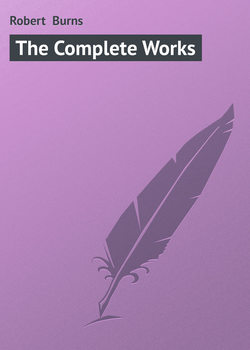Читать книгу The Complete Works - Роберт Бернс, Robert Burns - Страница 70
THE POETICAL WORKS OF ROBERT BURNS
LXVIII. LINES ON MEETING WITH LORD DAER
Оглавление[“The first time I saw Robert Burns,” says Dugald Stewart, “was on the 23rd of October, 1786, when he dined at my house in Ayrshire, together with our common friend, John Mackenzie, surgeon in Mauchline, to whom I am indebted for the pleasure of his acquaintance. My excellent and much-lamented friend, the late Basil, Lord Daer, happened to arrive at Catrine the same day, and, by the kindness and frankness of his manners, left an impression on the mind of the poet which was never effaced. The verses which the poet wrote on the occasion are among the most imperfect of his pieces, but a few stanzas may perhaps be a matter of curiosity, both on account of the character to which they relate and the light which they throw on the situation and the feelings of the writer before his work was known to the public.” Basil, Lord Daer, the uncle of the present Earl of Selkirk, was born in the year 1769, at the family seat of St. Mary’s Isle: he distinguished himself early at school, and at college excelled in literature and science; he had a greater regard for democracy than was then reckoned consistent with his birth and rank. He was, when Burns met him, in his twenty-third year; was very tall, something careless in his dress, and had the taste and talent common to his distinguished family. He died in his thirty-third year.]
This wot ye all whom it concerns,
I, Rhymer Robin, alias Burns,
October twenty-third,
A ne’er-to-be-forgotten day,
Sae far I sprachled up the brae,
I dinner’d wi’ a Lord.
I’ve been at druken writers’ feasts,
Nay, been bitch-fou’ ‘mang godly priests,
Wi’ rev’rence be it spoken:
I’ve even join’d the honour’d jorum,
When mighty squireships of the quorum
Their hydra drouth did sloken.
But wi’ a Lord—stand out, my shin!
A Lord—a Peer—an Earl’s son!—
Up higher yet, my bonnet!
And sic a Lord!—lang Scotch ells twa,
Our Peerage he o’erlooks them a’,
As I look o’er my sonnet.
But, oh! for Hogarth’s magic pow’r!
To show Sir Bardie’s willyart glow’r,
And how he star’d and stammer’d,
When goavan, as if led wi’ branks,
An’ stumpan on his ploughman shanks,
He in the parlour hammer’d.
I sidling shelter’d in a nook,
An’ at his lordship steal’t a look,
Like some portentous omen;
Except good sense and social glee,
An’ (what surpris’d me) modesty,
I marked nought uncommon.
I watch’d the symptoms o’ the great,
The gentle pride, the lordly state,
The arrogant assuming;
The fient a pride, nae pride had he,
Nor sauce, nor state, that I could see,
Mair than an honest ploughman.
Then from his lordship I shall learn,
Henceforth to meet with unconcern
One rank as weel’s another;
Nae honest worthy man need care
To meet with noble youthful Daer,
For he but meets a brother.
